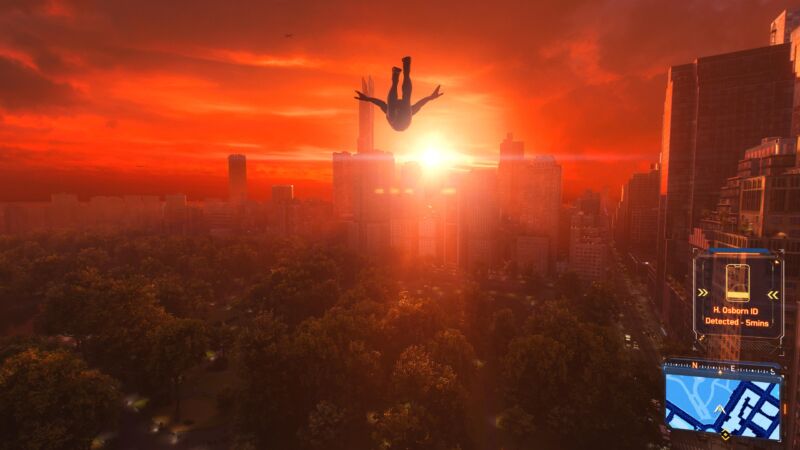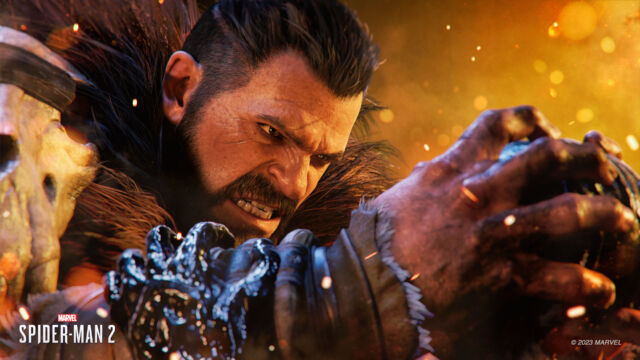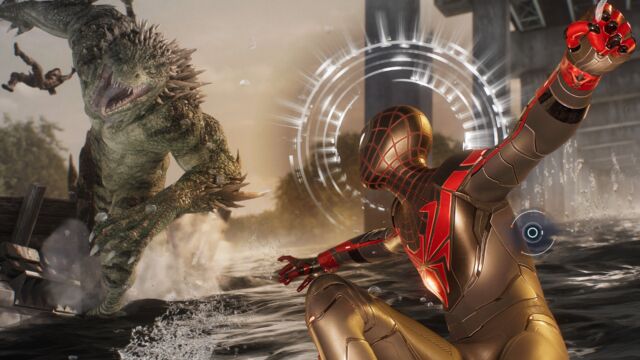
When making a sequel to a successful game franchise, developers have to walk a tightrope between continuity and upgrades. Change too much, and you risk ruining the careful balance of elements that made the original game work so well. Change too little, and you risk players getting tired of a new title that feels like more of the same.
As much as we liked 2020’s Spider-Man: Miles Morales, the game provided only minor tweaks to the successful formula established by Insomniac’s original 2018 take on everyone’s favorite wall-crawler. Spider-Man 2 is a slightly meatier sequel, with a bigger version of New York City to explore and a few welcome improvements in presentation and gameplay. Even so, the game still fits quite comfortably into the “more of the same” side of the sequel equation.
But we can’t say we’re too upset about this state of affairs. The basic open-world superheroics of Insomniac’s Spider-Man are so strong that this sequel can get by quite capably with a bit of tinkering at the margins. After three full games, it turns out we’re still not tired of defending Insomniac’s version of New York City.
A strained team-up
Pretty much every piece of pre-release hype for Spider-Man 2 focused on how the pairing of two separate Spider-Men—Peter Parker and Miles Morales—would implicitly lead to twice as much fun. It’s unfortunate, then, that the long-promised team-up feels more than a little forced here.
Sure, the complementary powers of the two Spider-Men can work well together in battle, especially when the action pauses for a cinematic team takedown that utilizes both characters at once. But neither character feels especially distinct from a gameplay perspective; the extremely slight differences in their special abilities don’t feel significant when you change from one to the other.
As far as the plot is concerned, the game tries to push a touching mentor/mentee relationship between the two Spider-Men that never really fits. A big part of the problem is that each protagonist seems wrapped up in his own little world.
Peter’s story quickly becomes entangled with that of Harry Osborne, a childhood friend who has finally recovered from a somewhat mysterious illness. Harry’s reintroduction helps solve an early mid-life crisis for Peter, offering him a role as a partner in a world-saving initiative powered by Osborne money and tech optimism (which, of course, quickly falls apart for reasons I won’t spoil here).

Miles, meanwhile, deals with an almost completely unrelated plotline centered around his internal battle between feelings of revenge and forgiveness directed at Mr. Negative, the man who killed his father. The serious and engaging pathos of Miles’ internal struggle is routinely and awkwardly cut against more pedestrian teenage concerns like filling out a college essay or gathering the nerve to ask out a girl.
Too much drama
When each Spider-Man occasionally gets dragged into the other’s drama, it feels like a forced pairing of what could easily be two completely separate games. And every moment of relatable human psychodrama is met with two more over-the-top superhero comic book melodrama. This is the kind of game where characters routinely yell their innermost feelings to each other while trading earth-shattering punches—and where characters never settle for showing their motivations when they can just tell the audience.

This is perhaps best exemplified by Kraven the Hunter, a scenery-chewing villain whose stated motivation is looking for a worthy opponent (e.g., Spider-Man) to give him a truly challenging fight before he dies an ignoble death by disease. Kraven and his army of literally thousands of painted warrior Hunters quickly wear out their welcome as snarling one-note caricatures that don’t really make a successful transition from the comic page.
Things pick up as the plot moves away from Kraven and toward every ’80s kid’s favorite badass symbiote, Venom. I don’t want to give away too much about the particular direction the game takes with Venom’s by-now-familiar “What if an alien entity made Spider-Man become kind of evil?” plotline. But I will say that the Venom plot bounces around in some surprising directions that lead to some interesting confrontations between major characters and their inner demons.
The biggest problem with the game’s main storyline, though, is the way subsequent missions can shift in tone quickly enough to give you whiplash. A moment of thrilling action will be followed directly by a cheesy, nostalgic saunter around a street fair. A tense stealth mission where Mary Jane has to silently take out guards with a stun gun is followed by a high-octane setpiece that barrels along with minimal player input, save for a few responses to on-screen quick time event prompts.

That whiplash extends to the game’s visual and audio presentation. One moment, you’re watching some of the greatest action cinematography you’ve ever seen in a video game, and the next, you’re watching Mary Jane’s plastic-looking face grimace straight through the uncanny valley. One moment, you’re marveling at the stunning lighting in an intensely surreal, psychologically symbolic dream sequence, and the next, you’re listening to two characters accidentally talk over each other as the game’s audio engine struggles.
The voice actors do their best to drag things along, especially when Spider-Man lets off a few of his trademark quips. But in the end, this is still a stereotypical superhero comic story, with all the hackneyed, overwrought presentation that can imply.
https://arstechnica.com/?p=1976493

